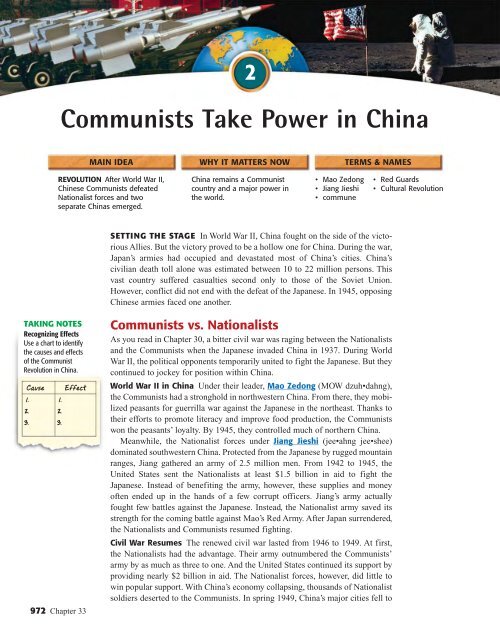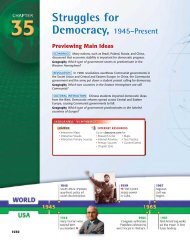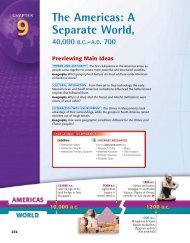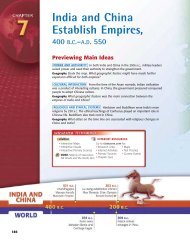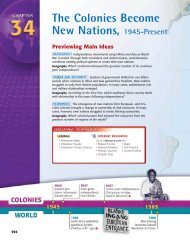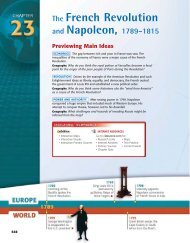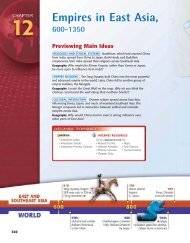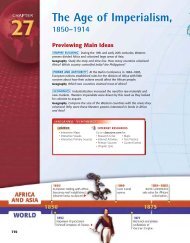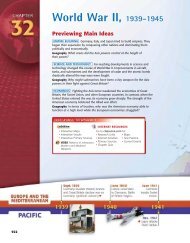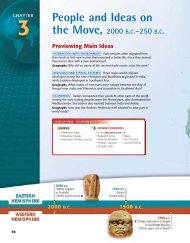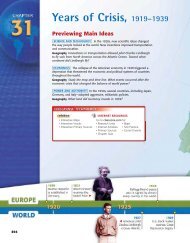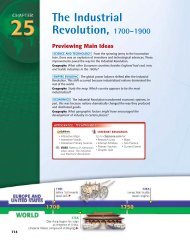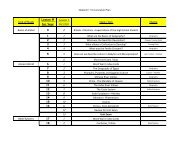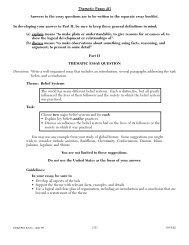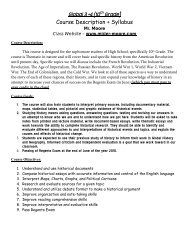Restructuring the Postwar World, - First
Restructuring the Postwar World, - First
Restructuring the Postwar World, - First
Create successful ePaper yourself
Turn your PDF publications into a flip-book with our unique Google optimized e-Paper software.
TAKING NOTES<br />
Recognizing Effects<br />
Use a chart to identify<br />
<strong>the</strong> causes and effects<br />
of <strong>the</strong> Communist<br />
Revolution in China.<br />
Cause Effect<br />
1. 1.<br />
2. 2.<br />
3. 3.<br />
972 Chapter 33<br />
Communists Take Power in China<br />
MAIN IDEA WHY IT MATTERS NOW TERMS & NAMES<br />
REVOLUTION After <strong>World</strong> War II,<br />
Chinese Communists defeated<br />
Nationalist forces and two<br />
separate Chinas emerged.<br />
2<br />
China remains a Communist<br />
country and a major power in<br />
<strong>the</strong> world.<br />
• Mao Zedong<br />
• Jiang Jieshi<br />
• commune<br />
SETTING THE STAGE In <strong>World</strong> War II, China fought on <strong>the</strong> side of <strong>the</strong> victorious<br />
Allies. But <strong>the</strong> victory proved to be a hollow one for China. During <strong>the</strong> war,<br />
Japan’s armies had occupied and devastated most of China’s cities. China’s<br />
civilian death toll alone was estimated between 10 to 22 million persons. This<br />
vast country suffered casualties second only to those of <strong>the</strong> Soviet Union.<br />
However, conflict did not end with <strong>the</strong> defeat of <strong>the</strong> Japanese. In 1945, opposing<br />
Chinese armies faced one ano<strong>the</strong>r.<br />
Communists vs. Nationalists<br />
As you read in Chapter 30, a bitter civil war was raging between <strong>the</strong> Nationalists<br />
and <strong>the</strong> Communists when <strong>the</strong> Japanese invaded China in 1937. During <strong>World</strong><br />
War II, <strong>the</strong> political opponents temporarily united to fight <strong>the</strong> Japanese. But <strong>the</strong>y<br />
continued to jockey for position within China.<br />
<strong>World</strong> War II in China Under <strong>the</strong>ir leader, Mao Zedong (MOW dzuh•dahng),<br />
<strong>the</strong> Communists had a stronghold in northwestern China. From <strong>the</strong>re, <strong>the</strong>y mobilized<br />
peasants for guerrilla war against <strong>the</strong> Japanese in <strong>the</strong> nor<strong>the</strong>ast. Thanks to<br />
<strong>the</strong>ir efforts to promote literacy and improve food production, <strong>the</strong> Communists<br />
won <strong>the</strong> peasants’ loyalty. By 1945, <strong>the</strong>y controlled much of nor<strong>the</strong>rn China.<br />
Meanwhile, <strong>the</strong> Nationalist forces under Jiang Jieshi (jee•ahng jee•shee)<br />
dominated southwestern China. Protected from <strong>the</strong> Japanese by rugged mountain<br />
ranges, Jiang ga<strong>the</strong>red an army of 2.5 million men. From 1942 to 1945, <strong>the</strong><br />
United States sent <strong>the</strong> Nationalists at least $1.5 billion in aid to fight <strong>the</strong><br />
Japanese. Instead of benefiting <strong>the</strong> army, however, <strong>the</strong>se supplies and money<br />
often ended up in <strong>the</strong> hands of a few corrupt officers. Jiang’s army actually<br />
fought few battles against <strong>the</strong> Japanese. Instead, <strong>the</strong> Nationalist army saved its<br />
strength for <strong>the</strong> coming battle against Mao’s Red Army. After Japan surrendered,<br />
<strong>the</strong> Nationalists and Communists resumed fighting.<br />
Civil War Resumes The renewed civil war lasted from 1946 to 1949. At first,<br />
<strong>the</strong> Nationalists had <strong>the</strong> advantage. Their army outnumbered <strong>the</strong> Communists’<br />
army by as much as three to one. And <strong>the</strong> United States continued its support by<br />
providing nearly $2 billion in aid. The Nationalist forces, however, did little to<br />
win popular support. With China’s economy collapsing, thousands of Nationalist<br />
soldiers deserted to <strong>the</strong> Communists. In spring 1949, China’s major cities fell to<br />
• Red Guards<br />
• Cultural Revolution


